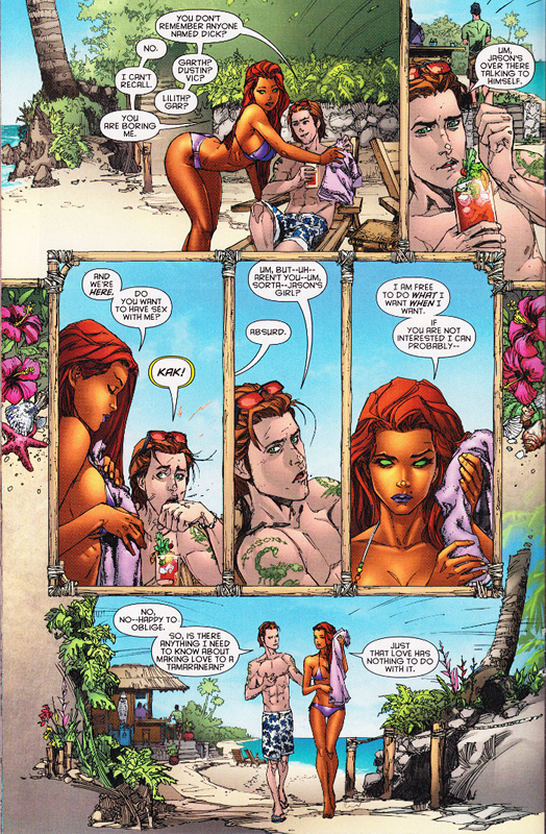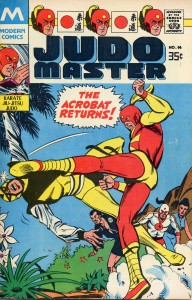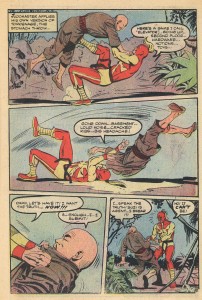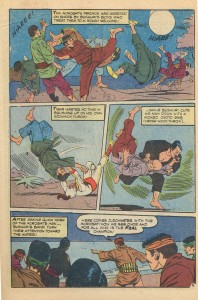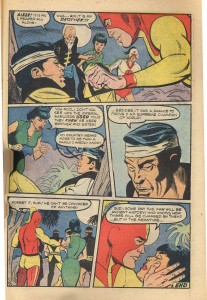I have bought zero (0) DC comics in the last…um…well I’m not sure how long. (Unless you count Tiny Titans. Does that count?)
Anyway, the point is, I haven’t read any of the new reboot titles. Nonetheless, I surf the internets, and the new (new!) issue of Red Hood and the Outlaws appears to have really gone above and beyond and then through the basement and into the pig trough in its pursuit of the absolute, uncontested, nadir of idiotic giggling fanboy “I have never seen a woman but occasionally I wipe my dick with my four-colored friends” sexism.
But the one glimmer of goodness here is that DC’s idiocy has prompted a good bit of entertaining blogosphere commentary. For example, this from Graeme McMillan at Newsarama.
That’s right, fanboys! You liked it when Starfire wanted to jump into bed with Robin way back when they were in the New Teen Titans together? Well now she’s a sex-hungry warrior bimbo who not only can’t remember her ex-boyfriend, but can’t tell men apart so she’ll sleep with them all! That’s, uh, definitely the reboot that some people were potentially wanting to see! Maybe! Possibly.
Kickpuncher over at fempop is even more amusing.
Scott Lobdell gives his audience, his industry, possibly his entire gender the finger and says “Oh no, you motherfuckers. That’s not your fantasy. Your fantasy is a woman that will literally have sex with you just for existing. No woman with any standards, no matter how low, no matter how forgiving, could possibly be attracted to you, so here’s your new sex object—a brain-damaged goldfish with a rack. And you’re such a scared little boy, so afraid of commitment in even your own pathetic fantasies, that you’ll run away from a ‘clinger’ even if she’s as gorgeous, charming, and supportive as the woman Starfire used to be. You can’t bear even that slight chance that she’ll make you move out of your parents’ basement, get a real job, and make something of yourself. So I’ll cater to that too! Not only doesn’t she want a relationship, she won’t even remember you! That’s what you want in the end, isn’t it? A vagina-shaped goldfish! Look upon your lust, ye nerdy, and despair.”
Laura Hudson at Comics Alliance is more sober.
Most of all, what I keep coming back to is that superhero comics are nothing if not aspirational. They are full of heroes that inspire us to be better, to think more things are possible, to imagine a world where we can become something amazing. But this is what comics like this tell me about myself, as a lady: They tell me that I can be beautiful and powerful, but only if I wear as few clothes as possible. They tell me that I can have exciting adventures, as long as I have enormous breasts that I constantly contort to display to the people around me. They tell me I can be sexually adventurous and pursue my physical desires, as long as I do it in ways that feel inauthentic and contrived to appeal to men and kind of creep me out. When I look at these images, that is what I hear, and I don’t think I even realized how much until this week.
And I’m tired. I’m so, so tired of hearing those messages from comics because they aren’t the dreams or the escapist fantasies or the aspirations that I want to have. They don’t make me feel joyful or powerful or excited. They make me feel so goddamn sad that I want to cry, because I have devoted my entire life to comics, and when I read superhero books like these I realize that most of the time, they don’t give a sh*t about me.
I have been doing this for a long time, now. I have lived in the neighborhood of superhero comics for a long time. And frankly, if this is how they think it’s ok to treat me when I walk down the street in a place that I thought belonged to me just as much as anyone else who lives here, then I’m not sure I want to live here anymore.
I think Laura’s got the right idea…but I hope she moves quickly through grief and on into indifference. Because nobody should be crying over contemporary mainstream superhero comics.
And the reason nobody should cry is because Laura’s absolutely right. Mainstream comics don’t give a shit about her. Criticizing DC is worthwhile because pointing out sexism is worthwhile and good writing is worthwhile and most of all because these morons deserve to be insulted. But hoping that Dan Didio is going to give a fuck about feminist complaints is like hoping that the coal industry will, after serious discussion, suddenly decide that solar energy is the future. You can teach an old dog new tricks, maybe, but you can’t turn an old dog into a penguin.
I’ve said this before more or less (most recently here) but maybe it bears repeating. Superhero comics are a tiny, niche market. Within that market, women are a tiny minority (10% at best, from the figures I’ve been able to find.) The audience for superhero comics is the small rump of 30-year-old plus men who have been reading superhero comics for 20-plus years and still want to read about the child-oriented characters of their youth — only, you know, in a kind of skeevy, adult way.
Now, maybe you read superhero comics, and that doesn’t describe what you want from them. Which is cool — but it’s worth realizing that you are in the minority (among superhero comics readers. You’re among the vast, vast majority in terms of the rest of the world, obviously.)
If the reboot makes anything clear, it’s that the core audience remains the core audience. It’s not going anywhere. This is what mainstream superhero comics are.
The point being, the best possible outcome here is not that DC starts writing better stories. It isn’t that they become more diverse. It isn’t that they hire more female creators. The best possible (note I said “possible”) outcome is that these shitheads finally, finally go out of business.
And if they do, you know what? It won’t be the end of comics, because there are lots and lots of comics. It won’t be the end of superheroes, because they’ll go on in other mediums…and, for that matter, there are lots of superhero comics not by the big two (many of them made in Japan). It won’t even be the end of your favorite characters, I wouldn’t think — there’ll still be back issues. If you love Starfire you can reread those old Teen Titans comics, which certainly had their problems…but at least Marv Wolfman seemed to care about Starfire the way creators care about their characters, rather than the way fanboys care about the fetish object they’ve been wanking to for decades.
And if you must, must, must have new Starfire content…well, write it yourself. Your fan fiction isn’t going to be any worse, and certainly won’t be any less “valid”, than the crappy corporate fan fiction DC is churning out. DC doesn’t own your characters, they don’t own your dreams, and they don’t own your aspirations. What they do own is some copyrights, and no doubt those will only be removed with force from their cold, dead corporate hands. Which is all the more reason to wish those cold corporate hands extinct. Maybe, if we’re very lucky, this reboot will be looked back upon not as another failed, stupid, embarrassing detour, but as the beginning of the end.

